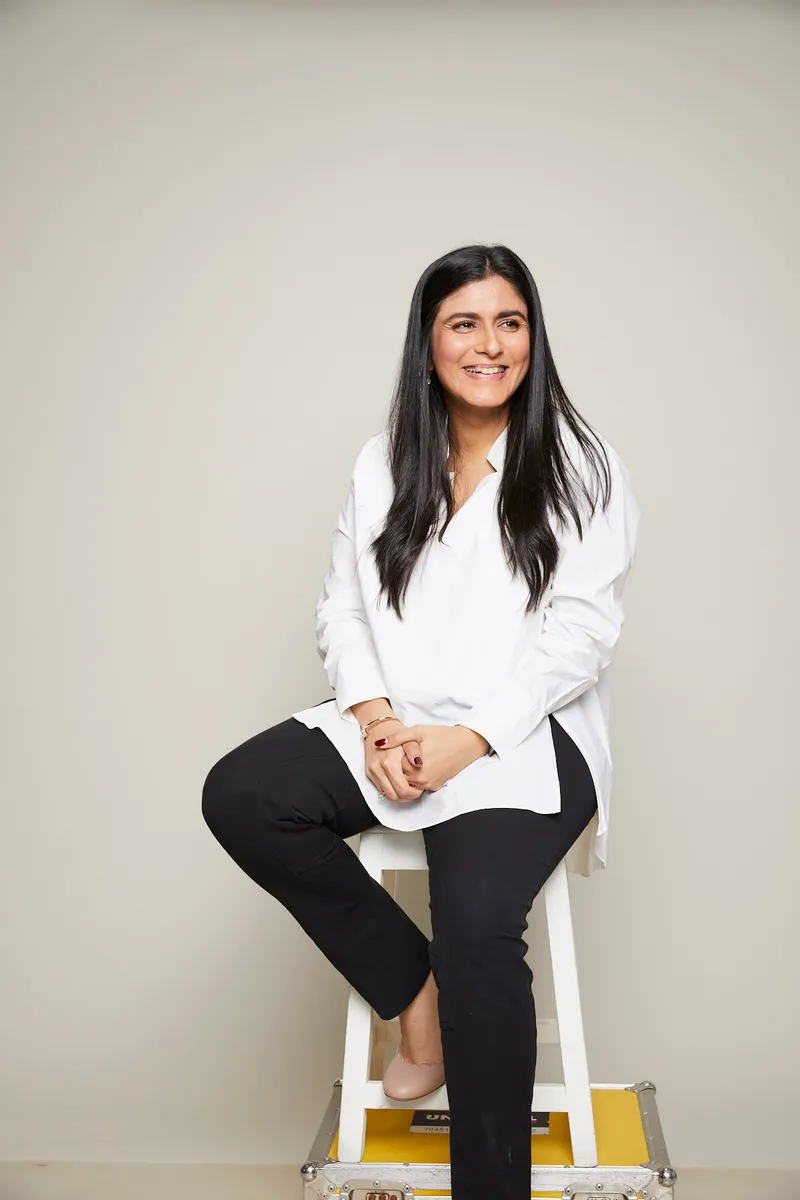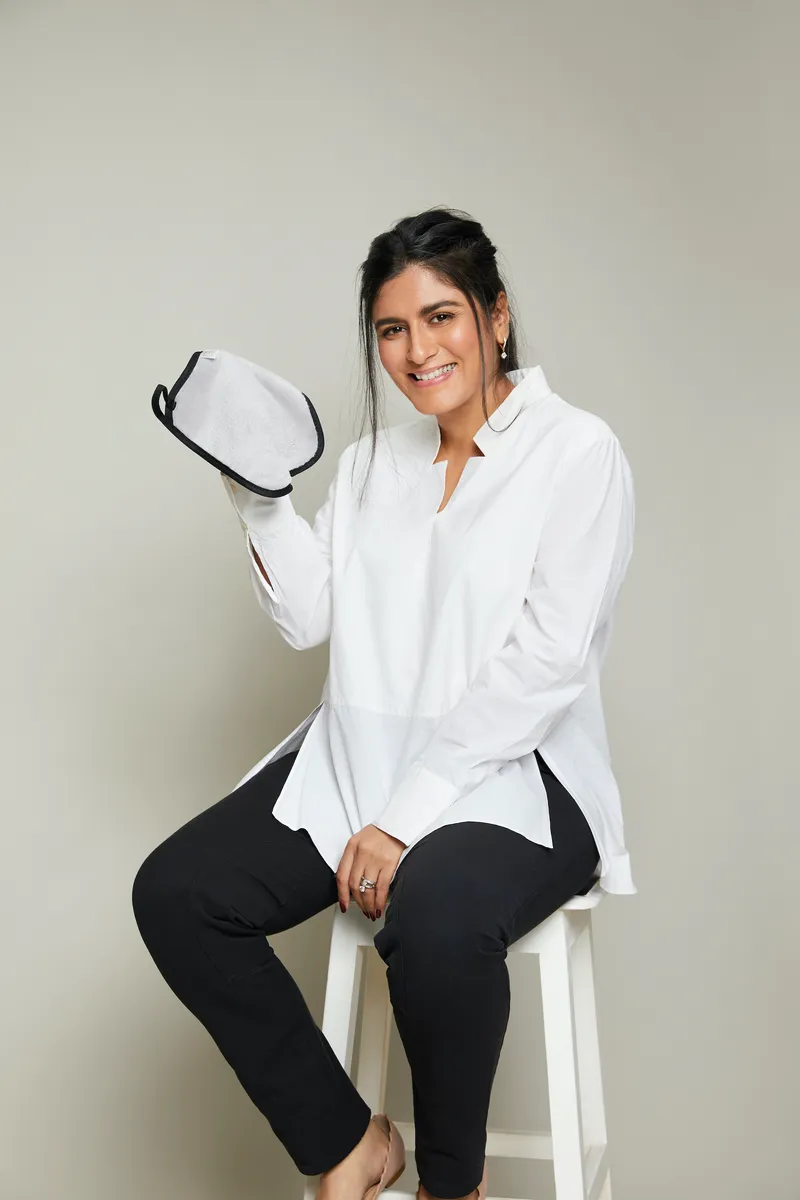Celebrity makeup artist Namrata Soni on overcoming challenges and making it big in a male-dominated industry
After creating iconic looks for Sonam Kapoor and Deepika Padukone, Namrata Soni recently took the entrepreneurial route to launch her sustainable beauty line, Simply Nam.
The Indian makeup and hair industry has not always been very welcoming to women. Two decades ago, the rule in the Bollywood film industry was absolute.
All hairdressers had to be women, and makeup had to be done by men.
When Namrata Soni was appointed as the makeup artist for one of Dharma Production's films, she was physically dragged out of the sets for having the audacity to challenge the system. However, every time Namrata approached the film industry union for a union card, she would be dismissed and sent back.

Celebrity makeup artist Namrata Soni
After Namrata put up a fight with others for more than a decade, in 2014, the Supreme Court of India put an end to the 59-year-old de facto ban on women working as makeup artists on Bollywood film sets.
“I am talented, I have invested in myself, got a degree and I have worked hard. I demand to be paid as much or more than what female makeup artists were earning back then. I want to raise the bar,” says the celebrity makeup artist in a conversation with YS Weekender.
Two decades in the industry, Namrata has created some iconic looks including that of Deepika Padukone’s from Om Shanti Om, and the famous dark lipstick and liner look of Sonam Kapoor Ahuja for Cannes. Additionally, Namrata has created looks for actors Janhvi Kapoor, Sara Ali Khan, Disha Patani, Radhika Apte, and Sonakshi Sinha, among others.

Namrata Soni and Sonam K Ahuja | Source: Instagram
She also launched her beauty brand Simply Nam in December 2020. It advocates a vegan and sustainable approach to makeup and beauty.
Starting early
Born and brought up in Mumbai, Namrata spent seven years in a boarding school. “I have been a hairstylist ever since then,” she laughs. Initially being the hairdresser for her buddies at boarding school, Namrata started working in the makeup industry when she was just 20-years. In 2001, she started assisting famous hairstylist Coleen Khan. Later, Namrata did her professional makeup course at Delamar School of Makeup in London.
“For the first four years of my career, I was not paid,” Namrata says.
“Things were different back then...You could count on your fingers the number of women makeup artists in the industry. It was a male-dominated industry,” she adds.
Namrata returned to Mumbai and was assisting another makeup artist from B-town. She was invited to travel to Bengaluru where she spent a month assisting to do makeup for a movie. “It was my first paid gig...I got to work with Nandita Das, Purab Kohli, and Tannishtha Chatterjee,” she adds.

Sonam K Ahuja's Cannes 2018 makeup by Namrata Soni | Source: Instagram
On experiencing the set life for the first time, Namrata got a direction of the journey that she eventually wanted to take as an artist. Post this, she went on to assist Dilshad Pastakia. While working under her, Namrata was offered to work for Farah Khan’s Main Hoon Na, during which she did hair styling for actors like Shah Rukh Khan, Zayed Khan, and Amrita Rao. This is when Namrata started being recognised for her work.
Fighting for rights
During her fight against the Union and making it big in a male-dominated industry, Namrata says, “Dharma Productions, Farah Khan, and Sonam Kapoor were extremely supportive of me, and they wanted me to be a part of the industry and stood up for me.”
Namrata’s roadblocks, however, did not end there. “Even today, when I go for meetings, my expertise is questioned...sometimes people assume that women artists cannot work night shifts on the sets,” she adds.

Namrata Soni at work | Source: Twitter
However, Namrata says what broke her heart the most was when she did not find support by other women in the industry when she was just starting out.
“But that journey made me who I am today: a woman who cannot be bullied, and will stand up for herself and the right that she has today,” Namrata says.
Two decades in the industry, Namrata refuses to get a Union card for herself. “It is my choice to be or not be a part of the Union.”
Taking the entrepreneurial route
Namrata launched her beauty brand Simply Nam in December 2020. Designed in Scandinavia, with the Indian woman, climate, and lifestyle in mind, Simply Nam launched a makeup remover and cleansing towel. “It is an eco-friendly alternative to makeup removing wipes,” she explains.
But why entrepreneurship? “I have been looking to start my own brand for the past seven years. It took me that long to find the right partner and the right team,” she adds.
Namrata has stepped into this venture in association with Bozzil, a Swedish multi-market incubator that launches influencer brands in emerging markets. “I want to create a clean beauty line, and I want every person to be conscious of the carbon footprint. Today, I have a voice that people look up to and I feel I have the ability to change,” Namrata adds.

Namrata Soni poses with the Simply Nam makeup remover and cleansing towel
Presently, Namrata is gearing up to launch more products this year, and the makeup artist recently completed her project for upcoming Bollywood film Bunty and Babli-2.
Art and the artist
Speaking about her favourite canvas, Namrata says she wouldn’t think twice before exclaiming “Sonam Kapoor”. She says, Sonam’s film Aisha has been the closest to her heart. Namrata had just lost her mother, and that project made her carry on with everyday life.
Her work for Om Shanti Om won Namrata the IIFA in 2008, under the ‘Best Makeup” category.
Namrata says it was also the most challenging project she has ever indulged in. “I had to create the ageing makeup in the film, which was shot in an extremely humid city like Bombay (Mumbai). The makeup usually remains fresh for up to seven hours, but the shoot would go on for 12 to 18 hours,” Namrata explains.
In 2019, Namrata also received the Dadasaheb Phalke International Film Award for her work.

Namrata Soni was awarded the Dadasaheb Phalke International Film Award for her work in 2019
Namrata seeks inspiration from international makeup artists like Pat McGarth and Kevyn James Aucoin.
Her advice to aspiring makeup artists would be: “Makeup is like a reflection of the inner beauty of the person sitting on the chair. Respect that beauty and the person, highlight what they already have within. It is like painting a canvas that reflects who they are, do not change that.”
Edited by Megha Reddy









